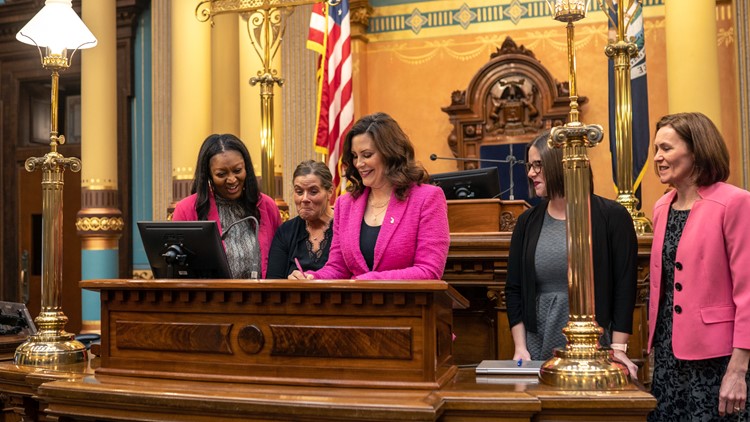LANSING, Mich. — The Democrat-controlled legislature was busy in 2023, passing hundreds of new pieces of legislation.
We are going to look at eight of those new laws that will go into effect in 2024.
Michigan Minimum Wage Increase
Beginning on Jan. 1, 2024, the state's minimum wage will increase from $10.10 to $10.33 per hour. The increase is part of the Michigan's Improved Workforce Opportunity Wage Act of 2018 framework to raise the minimum wage by 46 cents between 2023 and 2025.
In addition to the increase in hourly wages, tipped employee's hourly wages will also increase from $3.84 to $3.93 per hour. Training wages for newly hired employees ages 16 to 19 for their first 90 days of employment remain unchanged at $4.25 per hour.
On Jan. 1, 2025, the minimum wage will be raised to $10.56 per hour.
New Michigan Gun Laws
In the aftermath of the mass shooting at Michigan State University in February 2023, the Michigan legislature passed several gun violence prevention bills, which were signed into law by Governor Gretchen Whitmer.
In April, a universal background check bill and safe storage bill were signed into law by the governor. Then in May, Whitmer signed so-called "red flag" bills, establishing extreme risk protection orders that would allow courts to remove firearms from individuals that the court deems are dangerous to themselves or others.
And finally, in November a temporary law was put on the books making it more difficult for individuals with convictions for misdemeanor domestic violence to gain access to guns.
All of those gun violence prevention bills will be in effect in January 2024.
Michigan's Prevailing Wage Act Restored
The Prevailing Wage Act was restored with a few strokes of a pen by Gov. Whitmer. The act requires contractors working on local public projects in the state to be paid union-level wages.
The Prevailing Wage Act was first passed in 1965 and was in effect until it was repealed in 2018. In 2021, Gov. Whitmer restored the Prevailing Wage Act for state projects. The expanded Prevailing Wage Act will go back into effect in March 2024.
Michigan Ends 'Right-to-Work'
Michigan became the first state in decades to repeal a “right-to-work” law that allowed workers to opt out of paying union dues and fees in unionized workplaces.
The “right-to-work” legislation was originally passed by a Republican-controlled legislature in 2012. Michigan became the first state in 58 years to repeal a “right-to-work” law, with Indiana repealing its in 1965 before Republicans there restored it in 2012.
In total, 26 states now have “right-to-work” laws in place across the country.
The repeal will go into effect in 2024.
Michigan Expands LGBTQ+ Protections
Gov. Gretchen Whitmer signed legislation in March codifying LGBTQ protections into the state's civil rights law, permanently outlawing discrimination on the basis of sexual orientation or gender identity in the state.
New Michigan Election Law
Young Michiganders looking to get a head start on being able to cast their first election ballot will soon have a new way to do so.
Previously, those who were at least 17.5 years old were able to pre-register to vote if they would be 18 by Election Day.
But under House Bill 4569, signed into law by Governor Gretchen Whitmer on Nov. 30 and set to take effect on Feb. 13, anyone as young as 16 will be able to pre-register to vote and, therefore, be automatically able to cast their ballot in the first election following their 18th birthday.
Michigan Third-Grade Reading Law Repealed
A law encouraging schools to hold students behind for a year if they were more than one grade level behind in reading will end in 2024. The so-called "Read by Grade Three" law was first passed in 2016.
While the law didn't require the student to be held back, parents or educators needed to submit a "Good Cause Exemption" to challenge the student's retention.
Beginning next year, instead of schools holding the child back a grade, parents will now be required to be notified if their child is falling behind. After being notified, the school is required to provide "a reading intervention program intended to ensure that pupils are proficient readers by the end of grade 3."
Michigan's Clean Energy & Climate Action Package
In February, the historic Clean Energy & Climate Action Package of laws goes into effect. The legislation aimed to layout an energy plan for the state over the next two decades.
Michigan will join four other states in requiring utility providers to transition to 100% carbon-free energy generation by 2040 under legislation that was signed by Gov. Gretchen Whitmer. The state has also set a goal for utilities to generate 50% of their energy from renewable sources by 2030, a significant leap from the current 12%.
►Make it easy to keep up to date with more stories like this. Download the 13 ON YOUR SIDE app now.
Have a news tip? Email news@13onyourside.com, visit our Facebook page or Twitter. Subscribe to our YouTube channel.



